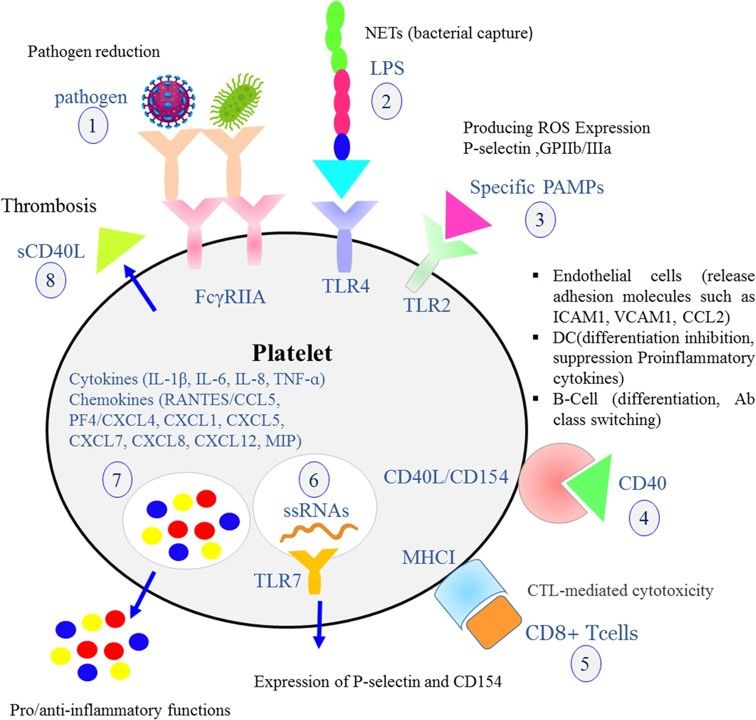Creative Biolabs is a well-recognized expert in the field of antibody generation and production. Especially, we have launched a series of in vitro diagnostic (IVD) antibody development services for different infections and diseases, including sepsis. Scientific progress has resulted in the discovery of novel disease biomarkers to fulfill the need for quicker, more specific and more accurate diagnosis of sepsis. Particularly, we provide IVD antibody development services against the CD40 marker.
CD40
CD40 (Bp50) is a surface antigen associated with T cell and B cell function. Its precursor contains 297 aa and is a type I transmembrane glycoprotein, consisting of the N-terminal signal peptide (20 aa), extracellular (193 aa), the transmembrane region (22aa) and the cytoplasmic region (62aa). CD40 is expressed in B cells, thymic epithelial cells and activates monocytes/macrophages, dendritic cells, hematopoietic progenitor cells, epithelial cells, endothelial cells, and some tumor cell lines such as hepatoma cell line HepG2, Sepsis cell line Wait. PMA, anti-IgM antibodies, anti-CD20 antibodies, and IFN-γ all stimulated B cells to express CD40. IFN-γ also stimulates tumor cells to express CD40. The signal transduction of CD40 is mainly through the regulation of non-receptor tyrosine protein kinases. CD40/CD40L plays a key role in mediating immune cell interactions and recognition and can affect the expansion and differentiation of T cells. Antigen is presented to T cells by antigen-presenting cells. After the formation of the major histocompatibility complex T cell receptor complex, the expression of CD40L on the surface of T cells is transiently up-regulated and binds to CD40 within 4 h of complex formation, and CD28/B7 cooperate to initiate and expand T cell-dependent immune response.
CD40 as Marker of Sepsis
Sepsis is caused by uncontrolled inflammation and procoagulant response to pathogens. Studies have found that platelets play a key role through the interaction with endothelial cells and the regulation of the innate and adaptive immune systems. Activated platelets can mediate cell-cell interactions and affect the innate immune response. Thrombin, collagen, ADP, platelet-activating factor (PAF) and other agonists, including LPS-induced platelet activation, can all lead to platelet-platelet aggregation. A variety of factors that contribute to inflammation and adaptive immune function are released, further promoting heterogeneous aggregates. How activated platelets mediate cell-cell interactions and affect innate immune responses? Platelets can also promote the activation of monocytes and dendritic cells (DCs) through the CD40-CD154 interaction, resulting in increased antigen presentation to T cells and enhanced adaptive immune responses.
 Fig.1 CD40 participates in activating platelet-mediated immune response.1
Fig.1 CD40 participates in activating platelet-mediated immune response.1
IVD Antibody Development Services Targeting CD40 Marker
Based on the rapid development of IVD technology and novel biomarkers, IVD antibodies are extensively used for disease screening and therapeutic monitoring. Diverse immunoassays are applied, including lateral flow assay, immunochemistry, sandwich ELISA, etc. Through our role as a leading antibody service provider, Creative Biolabs is well-positioned to deliver high-quality IVD antibody development services targeting numerous biomarkers of sepsis, such as CD40. With years of devotion and accumulation in this particular field, Creative Biolabs is confident in offering you the best products and services.
For more detailed information, please feel free to contact us or directly send us an inquiry.
Reference
- Fard, Mahin Behzadi, et al. "Thrombosis in COVID-19 infection: Role of platelet activation-mediated immunity." Thrombosis Journal 19 (2021): 1-11. under Open Access license CC BY 4.0, without modification.
For Research Use Only.

